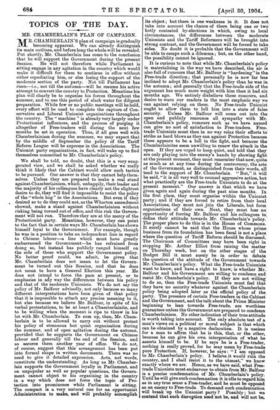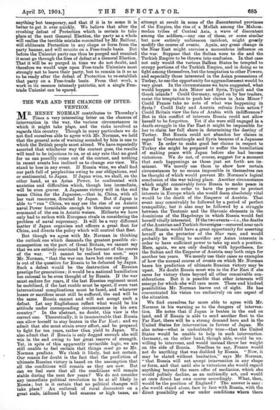TOPICS OF THE DAY.
MR. CHAMBERLAIN'S PLAN OF CAMPAIGN.
MR. CHAMBERLAIN'S plan of campaign is gradually becoming apparent. We can already distinguish its main outlines, and before long the whole will be revealed. Put shortly, Mr. Chamberlain has come to the conclusion that he will support the Government during the present Session. He will not therefore while Parliament is sitting engage in any agitation in the country which would make it difficult for them to continue in office without either repudiating him, or else losing the support of the moderate section of the party. Not till Parliament has risen—i.e., not till the autumn—will he resume his active attempt to convert the country to Protection. Meantime his plan will clearly be to organise his forces throughout the summer, and to use this period of slack water for diligent preparation. While few or no public meetings will be held, every effort will be used to complete the capture of Con- servative and Liberal Unionist organisations throughout the country. The " machine " is already very largely under Protectionist influences, and the process of purging it altogether of Free-traders will during the next few months be set in operation. Thus, if all goes well with Chamberlainism during the summer, we may expect that by the middle of September the policy of the Tariff Reform League will be supreme in the Associations. The Unionist party organisations, in fact, will wake up to find themselves committed to Mr. Chamberlain's policy.
We shall be told, no doubt, that this is a very exag- gerated view, and we shall be asked whether we really think it likely that the Cabinet would allow such tactics to be pursued. Our answer is that they cannot help them- selves. Unless they are prepared to make a real stand against Chamberlainism, which, unhappily, their leader and the majority of his colleagues have clearly not the slightest desire to do, they will find it impossible to resist the policy of the "whole hog" in the Associations. But even if they desired so to do they could not, as the Wharton amendment showed, make a stand against Chamberlainism without risking being turned out of office, and this risk the Govern- ment will not run. Therefore they are at the mercy of the Protectionist party. Meantime, however, they can point to the fact that in certain ways Mr. Chamberlain has shown himself loyal to the Government. For example, though he was in a position to take an independent line in regard to Chinese labour—a lino which must have greatly embarrassed the Government—he has refrained from doing so, but instead has publicly ranged himself on the side of those who support the Government policy. No better proof could, we admit, be given that Mr. Chamberlain does not mean to let the Govern- ment be turned out this Session, and that he does not mean to have a General Election this year. He does not intend to force the pace at present, or to emphasise in any way the differences between his policy and that of the moderate Unionists. We do not say the policy of Mr. Balfour advisedly, not only because so many different interpretations have been given of that policy that it is impossible to attach any precise meaning to it, but also because we believe Mr. Balfour, in spite of his verbal protestations, to be at heart a Chamberlainite, and to be willing when the moment is ripe to throw in his lot with Mr. Chamberlain. To sum up, then, Mr. Cham- berlain is to be allowed to carry out without protest his policy of strenuous but quiet organisation during the summer, and of open agitation during the autumn, provided that he supports the Government on Chinese labour and generally till the end of the Session, and so secures them another year of office. We do not, of course, suggest that this arrangement has been put into formal shape in written documents. There was no need to give it detailed expression. Acts, not words, constitute the understanding. As long as Mr. Chamber- lain supports the Government loyally in Parliament, and on unpopular as well as popular questions, the Govern- ment cannot object to his organising in the country in a way which does not force the topic of Pro- tection into prominence while Parliament is sitting. The compact is a very natural one for an opportunist Administration to make, and will probably accomplish its object ; but there is one weakness in it. It does not take into account the chance of there being one or two hotly contested by-elections in which, owing to local circumstances, the differences between the moderate Unionists and the Tariff Reformers will be brought into strong contrast, and the Government will be forced to take sides. No doubt it is probable that the Government will be able to escape such a dilemma; but, on the other hand, the possibility cannot be ignored.
It is curious to note that while Mr. Chamberlain's policy. is materialising in the way we have described, the air is also full of rumours that Mr. Balfour is "hardening" in the Free-trade direction; that personally he is now far less inclined to adopt Mr. Chamberlain's policy than be was in the autumn ; and generally that the Free-trade side of the argument has much more weight with him than it had six months ago. We entirely disbelieve these rumours, and desire to warn our readers in the most emphatic way we can against relying on them. No Free-trade Unionist ought to allow them to lull him into a state of false security. Unless Mr. Balfour will come out into the open and publicly renounce all sympathy with Mr. Chamberlain's policy, rumours such as we have named. can give no sort of satisfaction to Free-traders. Free- trade Unionists must then in no-way relax their efforts to strike as hard blows as they can against Protection because there appears to be a lull in the fight, and because the Chamberlainites seem unwilling to renew the attack in the open. If they are urged to keep quiet, and told that they are only playing into the enemy's hands by showing fight at the present moment, they must remember that now, quite as much as at any time during the controversy, the acts of the Government, as distinguished from their words, all tend to the support of Mr. Chamberlain. "But," it will be said, "it is all very well to counsel aggressive action, but what practically are the Free-trade Unionists to do at the present moment." Our answer is that which we have given again and again during the past nine months. In the first place, they must organise within the Unionist party ; and if they are forced to retire from their local Associations, they must not ijoin the Liberals, but form organisations of their own. Next, they must lose no opportunity of forcing Mr. Balfour and his colleagues to, define their attitude towards Mr. Chamberlain's policy. The proper place to do this is in the House of Commons. It surely cannot be said that the House whose prime business from its foundation has been fiscal is not a place where the question of Tariff Reform should be discussed. The Chairman of Committees may have been right in stopping Mr. Arthur Elliot from raising the matter on Thursday week, but on the other stages of the Budget Bill it must surely be in order to debate the question of the attitude of the Government towards Mr. Chamberlain's policy. What the Free-trade Unionists want to know, and have a right to know, is whether Mr. Balfour and his Government are willing to condemn and resist Mr. Chamberlain's policy. If they are not willing to do so, then the Free-trade Unionists must feel that they have no security whatever against the Chamberlain policy being adopted later as the official policy of the party. The presence of certain Free-traders in the Cabinet and the Government, and the talk about the Prime Minister beginning to lean towards Free-trade, are worthless guarantees unless the Government are prepared to condemn Chamberlainism. No other indication of their true attitude is worth taking into account. The only absolute test of a man's views on a political or moral subject is that which can be obtained by a negative declaration. It is useless for a man to affirm that he is this, that, or the other, because he can give his own interpretation of what he asserts himself to be. If he says he is a Free-trader, nothing is really proved, for he may mean by Free-trade pure Protection. If, however, he says : "I am opposed to Mr. Chamberlain's policy. I believe it would ruin the country, and I shall resist it to the utmost," we know exactly where we are. Hence, as we have said, what Free- trade Unionists must endeavour to obtain from Mr. Balfour is a precise condemnation of Mr. Chamberlain's policy. Until he will give such condemnation it is idle to regard him as in any true sense a Free-trader, and he must be opposed as an enemy to Free-trade. To demand such condemnation will break up the Unionist party ? Possibly ; but we contend that such disruption need not be, and will not be, anything but temporary, and that if it is to come it is better to get it over quickly. We believe that after the crushing defeat of Protection which is certain to take place at the next General Election, the party as a whole will realise the terrible mistake committed by Mr. Balfour, will obliterate Protection in any shape or form from the party banner, and will reunite on a Free-trade basis. But before the Unionist party can thus be purged and reunited it must go through the fires of defeat at a General Election. That it will be so purged in time we do not doubt, and therefore we would urge upon Free-trade Unionists most strongly not to leave their party, but to remain in it so as to be ready after the defeat of Protection to re-establish that party on a Free-trade basis. From that work, a work in its essence intensely patriotic, not a single Free- trade Unionist can be spared.























































 Previous page
Previous page